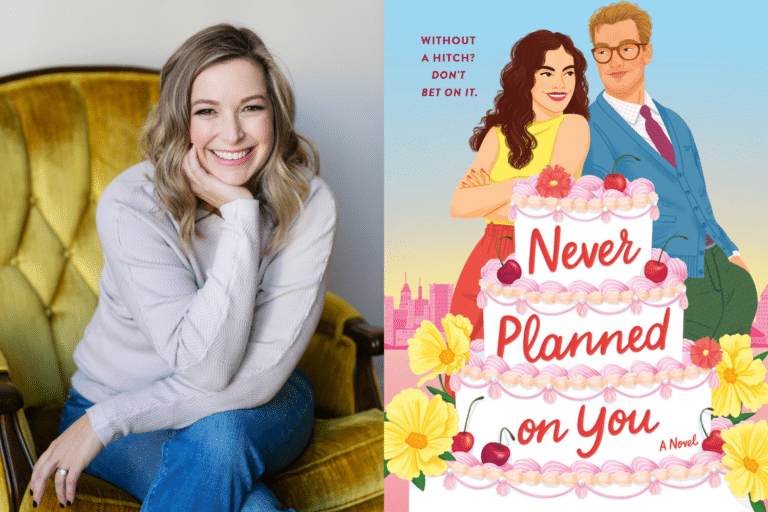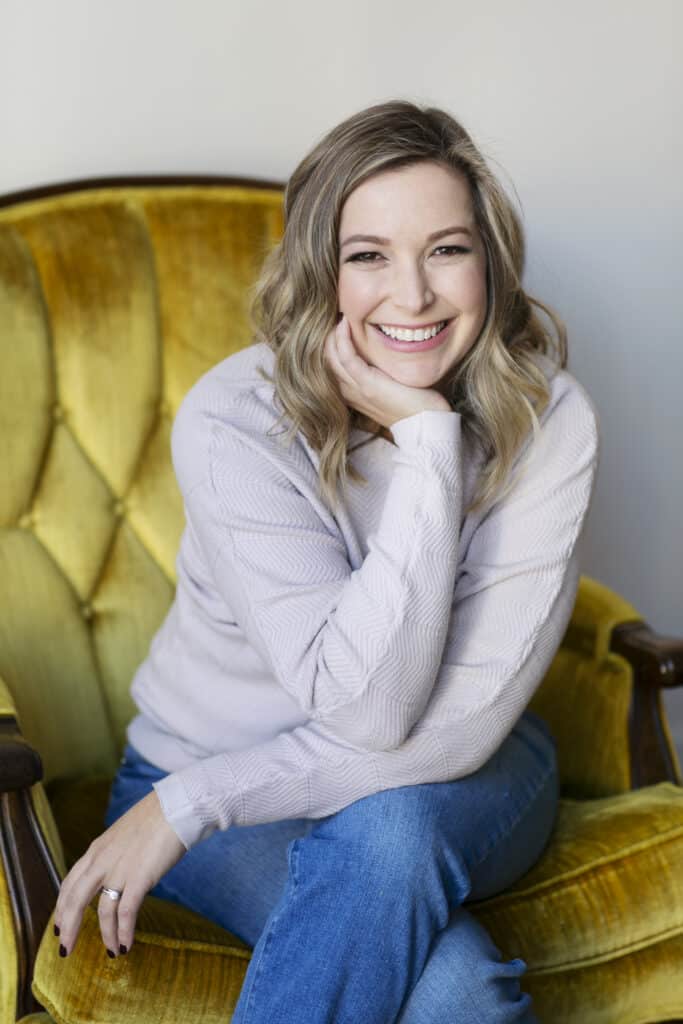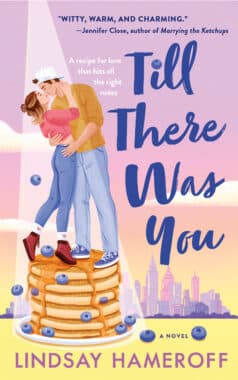
Valentine’s Day has come and gone, but the time for Jewish romance has not ended!
Author Lindsay Hameroff is back with “Never Planned on You,” a swoon-worthy second-chance romance released on Feb. 18. Packed with One Direction references, heart-fluttering moments, and the much-anticipated return of fan-favorite characters (yes, we mean you, Chad), this sequel is the perfect follow-up to her dazzling debut.
Meet Ali Rubin: free-spirited, fearless, and always up for a challenge. So when a tipsy dare leads her to get matching tattoos with a sexy British stranger, she’s all in. Fast forward a few years — Ali, now a chef-turned-event planner, has swapped careers, moved back home to Baltimore, and (surprise!) finds herself single again.
Just as she’s getting her life back on track, she crosses paths with him — the mystery man from that fateful night. But before she can fully process their history, fate throws a curveball: she’s been hired to plan his wedding… to someone else.

As “Never Planned on You” hits the shelves, Unpacked caught up with Lindsay Hameroff to talk about her latest book, favorite romance tropes, and why the world needs more flirty Jewish love stories.
The inspiration behind “Never Planned on You”
The idea of a “tattoo twin” first sparked when Lindsay Hameroff saw a New York Post alert about a woman who, after a drunken night, got a man’s name tattooed on her butt. Convinced he might be her true love, she set out on a mission to find him.
“It’s a little bit too silly, but it got me thinking about this idea of what if you got a tattoo with a random stranger and then that person was your soulmate. That kicked off the idea of a twin tattoo,” Hameroff told Unpacked.
Read more: Unpacked’s top 18 Jewish book picks for 2025
As a fan of late 90s and early 2000s romantic comedies, Hameroff often draws inspiration from her favorite films. “Till There was You” has shades of “Notting Hill” and “Never Planned on You” takes cues from “The Wedding Planner.”
After pitching the idea to her editor, Hameroff got the green light — with one caveat: the heroine had to be Ali, the best friend from her first book.

That sent her into problem-solving mode. How could hotel chef Ali suddenly become a wedding planner? The answer: a quarter-life crisis and a major career change. This shift not only made the plot work but also allowed Hameroff to move the story from New York City to her hometown of Baltimore.
“She’s changing careers and she comes home to get situated — that’s how the whole idea came down,” she said.
Bringing Baltimore (and bubbe) to life
Placing Ali in Baltimore allowed Hameroff to pull from her experiences of growing up in a Jewish family in Baltimore. By allowing Ali’s family members to play a central role in the novel she was able to dive deeper into her protagonist’s upbringing and what truly makes her tick.
“When I went to write a family, I felt like I needed to draw more from my own experiences,” she said. “Baltimore is special. When I grew up in Baltimore, I grew up in a community where every single person I knew was Jewish. It was such a weird microcosm. I thought replicating that experience would be fun to write.”
As a result, Never Planned on You is even more explicitly Jewish than Hameroff’s debut novel. While she never intended to make Judaism a bigger focal point, she quickly realized that capturing her Baltimore experience authentically meant weaving Jewish culture naturally into the story.
“Baltimore is very culturally diverse, but I felt like the only way that I could represent it, in a way that was authentic to me, was to write about my experience in Baltimore,” she said.
One of the most delightful elements of Jewish Baltimore that Hameroff brought to life? Ali’s bubbe. Inspired by the podcast Excuse My Grandma — where a Jewish grandmother and granddaughter hilariously discuss modern dating — and her own close bond with her grandmother, Hameroff knew a sassy grandma figure would be the perfect addition. Not only does Ali’s bubbe liven up the story, but she also serves as a trusted confidante for her granddaughter.

The second chance romance and the second novel
Both of Lindsay Hameroff’s novels center around second-chance romance—where characters cross paths, separate, and eventually reunite for their happily ever after. Hameroff admits she’s unconsciously drawn to the trope, noticing that all her story ideas seem to revolve around star-crossed lovers who reconnect after a misunderstanding or circumstances beyond their control.
“I like the idea of right person, wrong time. I just think that’s just very romantic. It has a fairy tale sort of thing too,” Hameroff said.
Hameroff is one of the lucky few authors whose debut novel was quickly picked up for publication. Stepping into her sophomore project, she was able to apply everything she had learned from the first book to make the writing process smoother.
“I didn’t learn lessons and then get to apply them to my first published book — ‘Till There Was You’ was the learning experience,” she said. “I made that book complicated for myself in ways that I didn’t need to, that I didn’t repeat this time.”
For instance, in “Till There Was You,” protagonist Lexi Berman is a chef — but Hameroff had no firsthand experience working in a restaurant or as a professional chef. That meant tons of research, which she enjoyed but found time-consuming.
With “Never Planned on You,” she made things easier on herself by setting the story in Baltimore—a city she knows inside and out. While she’s not a professional event planner like Ali, Hameroff is passionate about hosting events as a hobby, making it a natural and fun world to write about.
Food and books — a perfect pair
Though she’s never worked as a professional chef, Hameroff is an accomplished home cook — and she’s found a delicious way to blend her love of food with her books. She often shares recipes from her novels on social media, posting videos of herself making the dishes while chatting about her stories and personal life. This not only gives fans a behind-the-scenes look at her creative process but also lets them recreate the meals from her books in their own kitchens.
“I cook all the time. I host all the holiday dinners. I’m the Ali of my family, doing all the dinners and the cooking,” she said. “Food is interesting to me, and I like cooking, so my writing became a lot of food writing.”
“I started doing the cooking videos because I thought it would be just like a different and interesting way to promote the first book, but people really liked it, and so I kept doing it. It’s something that I was doing as a hobby, anyway, that I just connected the two areas of interests. It’s so Jewish,” Hameroff added.
Normalizing Judaism in romance novels
In her books, Hameroff strives to normalize Jewish identity within her characters. While their Judaism shapes who they are, it doesn’t define their struggles or serve as the central plot point.
“I don’t want to write Jewish romance where the plot itself is about Judaism. I want to write a romance where the characters are Jewish and Judaism informs their identity, but it doesn’t necessarily inform the plot,” she said, adding that shows like “The Nanny” and “The Marvelous Mrs. Maisel” were her inspirations for the types of Jewish representation she wanted to share.
This approach is a stark contrast to the Jewish literature Hameroff grew up with. As an English and Jewish Studies student in college, she was eager to dive into Jewish books — only to find that most of them centered on trauma.
“There were no romances that didn’t take place in the concentration camp,” she said. “I think it’s important to present Jews as current members of society, and not just victims in a past historical event. Jewish people are just living normal lives every day, and I think it’s important to represent them in a space other than the victim — other than a space of suffering.
“We also like love stories, and we also just want a happy ending.”
Beyond representation, Hameroff sees literature as a powerful tool to combat antisemitism and build empathy. She believes that when people read diverse stories and see themselves reflected on the page, they become more understanding of others.
“Jewish representation is especially important right now, at a time when antisemitism is so prevalent, because there are readers who have never encountered a Jewish person in real life. Their only knowledge of Judaism is coming from social media and a lot of it negative. But books build empathy; they are a pathway into another person’s lived experience. Books with Jewish characters and experiences provide authentic representation and in that way, I think they are a tool to educate,” she said.
Hameroff hopes that when readers finish “Never Planned on You” they’ll understand that happily ever after doesn’t look the same for everyone. Especially in parts of the Jewish community, she said, where there’s a lot of pressure to get married and settle down, she wants readers to embrace their journey — whatever that may be.
“Your path and career and love life is going to look the same, and it doesn’t mean it’s any less valid, and it doesn’t mean it doesn’t deserve to be celebrated,” she said. “I want people to read the book and feel like it’s OK not to have it all together, it’s OK to be figuring out what you’re doing still, no matter what age you are, and you’re still going to be loved and accepted.”

